Ever thought about estimating website costs before starting your online project? Whether you dream big as an entrepreneur or aim to grow your business online, it’s critical to know your budget.
A website cost calculator lets you skip the guessing game of your web design project. You get a detailed cost estimate that fits your specific needs. Now, planning your budget for a simple blog or a complex e-commerce site is easier.
Creating a custom website can cost between $1,000 to $50,000. However, with the right tools, these figures become helpful. Tools help you understand key factors like branding and design complexity. Also, knowing if you need a mobile-friendly site helps you avoid unnecessary surprises. Website pricing tools shed light on your path to a successful online journey.
Now, let’s explore the wide world of website costs. It doesn’t matter if you’re a small business, an individual, or a nonprofit. A calculator helps you meet your project’s needs while keeping an eye on your finances. Also, for those diving into custom web applications, features like a smart UI and custom widgets can increase costs and your website’s capability.
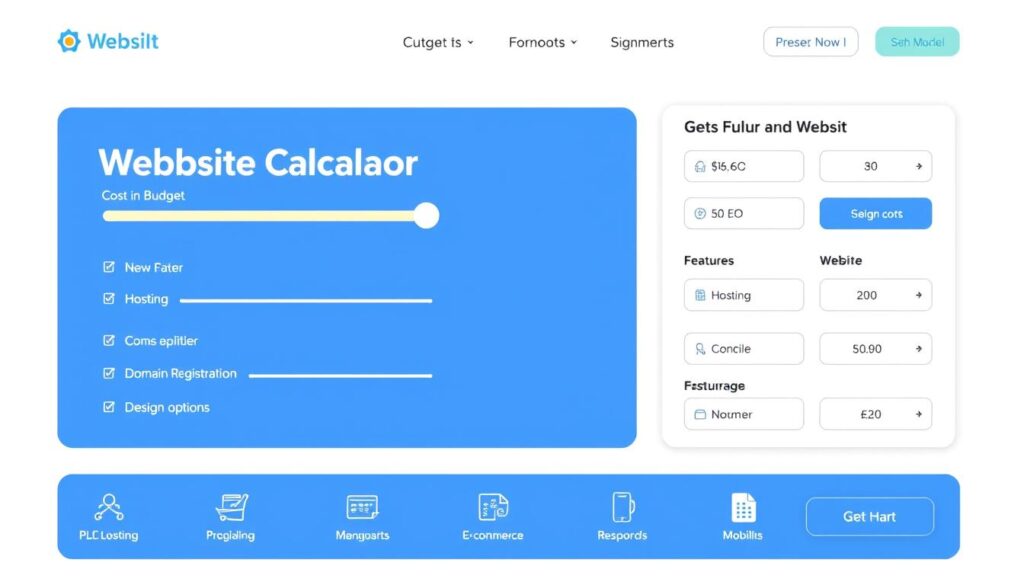
Keep reading to uncover the secrets of this indispensable tool. You’ll understand why many see a website cost calculator as essential. It’s a must-have for anyone serious about their web design project.
Understanding Website Design and Development Costs
Looking into website creation or updates means learning about web development costs. These costs depend on project size, design quality, and needed features. Let’s check out what affects website design cost.
Key Factors Influencing Web Development Expenses
The cost of a custom website starts with its complexity and size. Small businesses might need a simple site. Big companies often want complex sites with advanced features.
Also, your choice between a freelancer, an agency, or a corporation affects the price. Freelancers might be cheaper and offer a personal touch. Agencies and corporations offer full packages but cost more. They have advanced tools.
- Freelancer costs: Typically range from $1,001 to $5,000 annually.
- Agency costs: Can vary from $501 to $150,000+ per project, depending on specifications.
- Corporate rates: Often charge between $1,000 to $1,600 per month.
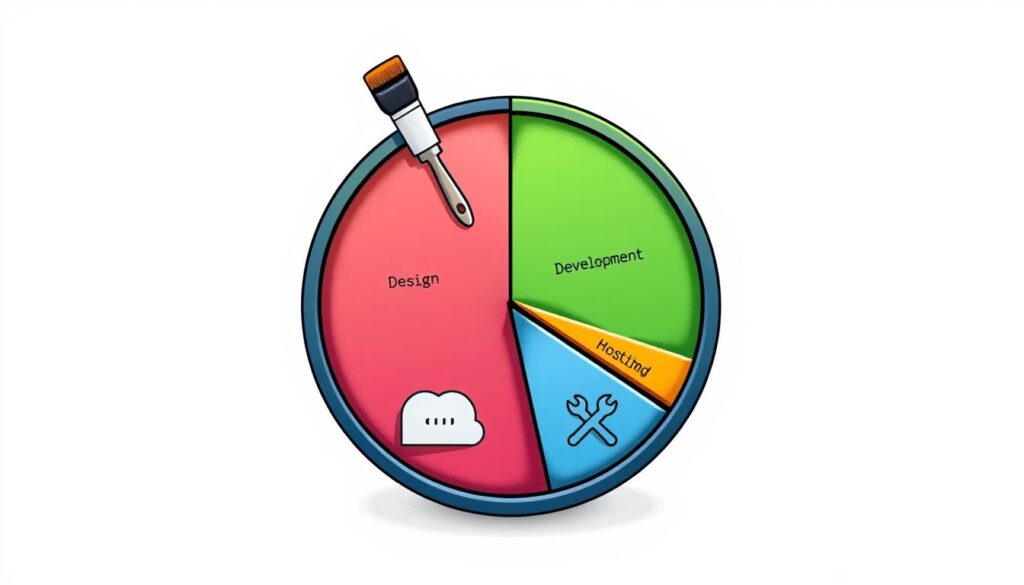
Categorizing Costs: From Basic to World Class Designs
Varying website sophistication affects design costs. Basic designs are more affordable. World-class designs are pricier but provide a competitive edge.
| Design Level | Cost Range |
|---|---|
| Basic | $2,000 – $3,000 |
| Standard | $3,000 – $5,000 |
| Excellent | $5,000 – $10,000 |
| World-class | $10,000 – $15,000 |
Your budget matters for your website project. Knowing these cost categories helps in decision making. Going for higher quality design improves user experience and helps your brand succeed online.
The Importance of Responsive Design in Website Pricing
Today, having your website work on all devices is a must, not just a choice. Responsive design is key in website development. It’s important for web designers to use responsive design. This improves website functionality, SEO, and user experience.
Website content is vital for keeping people interested. But if it doesn’t work on mobile or tablet, many will leave. In fact, 61 percent of users will leave a non-mobile-friendly site quickly. So, having a responsive design is critical for any business online.
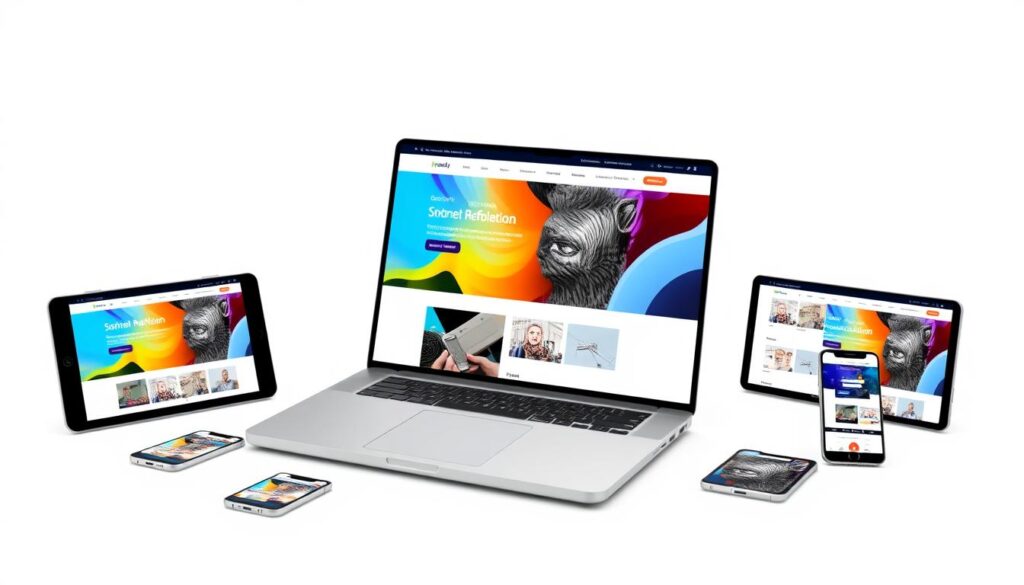
Google has valued mobile-friendliness in its rankings since 2015. Thus, having a responsive design is necessary for better SEO. A responsive site adjusts to any device screen, keeping website functionality great everywhere.
The cost to add responsive design is worth it. Responsive design makes a better user experience and is cost-effective. It means you don’t need different versions of your site. This saves on development and long-term upkeep costs.
| Feature | Benefits | Percentage of Websites Implementing |
|---|---|---|
| Responsive Design | Improves SEO, enhances user experience, single website for all devices. | High |
| SSL Certificates | Enhances security, improves trustworthiness. | Significant |
| Google Analytics | Tracks performance, optimizes marketing strategies. | Widespread |
| Live Chat Support | Improves customer service, quick query resolution. | Rising |
Responsive design is cost-effective and improves website functionality and SEO. For more info, visit WordPress Website Packages. This site gives details on how to add responsive design to your business.
Adding responsive design is crucial when planning your website budget. Choose an experienced web designer. This choice sets the foundation for your site’s success on different platforms. It’s a smart long-term investment for online marketing success.
SEO Considerations When Estimating Website Costs
Starting a new website or updating an old one requires SEO from the start. It’s crucial. Knowing how SEO affects the costs can change both the first and ongoing expenses. This knowledge impacts both initial setup and maintenance costs.
How SEO Influences Design and Development Charges
SEO is not just about the words on your site. It goes deep into design and how your site works. Your site should load quickly, be easy to use on phones, and be simple to navigate. Sites optimized well perform better in searches and give users a good experience, making them stay longer and buy more. Though it may cost more at the beginning, this approach improves visibility and saves on marketing costs later on.
Investing in SEO-Ready Websites for Long-Term Benefits
Choosing an SEO-ready website is a smart move. It might increase the upfront cost, but it pays off with better search results and lower marketing costs over time. Starting with a site built for SEO avoids expensive changes down the road.
Let’s see how SEO pros spend their budgets:
| Budget Range | Type of Campaign | Prevalence |
|---|---|---|
| $1,001 – $5,000 | Local Campaigns | Most Common |
| Over $10,000 | National/International Campaigns | Frequent |
Business owners unsure about SEO should consider its long-term value. Unlike pay-per-click (PPC) ads, SEO builds lasting growth. Its benefits grow over time, making it a solid choice for the future.
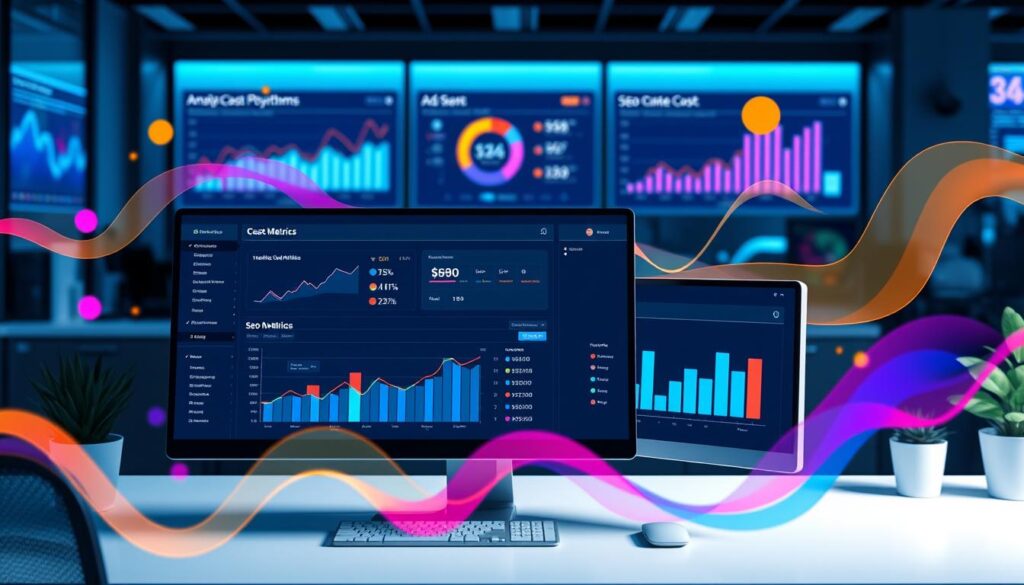
Thinking about SEO early on can make your website strong. It helps pull in and keep visitors effectively. This way, your site can become a leading name in its field without always spending on ads.
Exploring the Website Cost Calculator Tool
When starting a web project, knowing costs upfront is key. That’s where a website budget estimator tools come in handy. Using the web development price calculator gives you a real-time cost estimate. It helps keep your project within budget and meet your goals.
How to Use the Website Cost Calculator for Budget Planning
Using the website budget estimator is easy and helpful. Just enter information like the number of pages and specific features you want. For example, if you need e-commerce or user login. The tool then provides a customized estimate to help you plan your budget well.
Real-time Estimates with an Interactive Pricing Tool
The great thing about an interactive website cost calculator is seeing costs change in real-time. As you adjust options, you can see how it affects the total cost. This helps with budgeting and making choices on what features are worth it.
Furthermore, the calculator looks at different design and development choices to give an accurate estimate of website expenses. This way, you can get a cost-effective plan without needing multiple quotes.
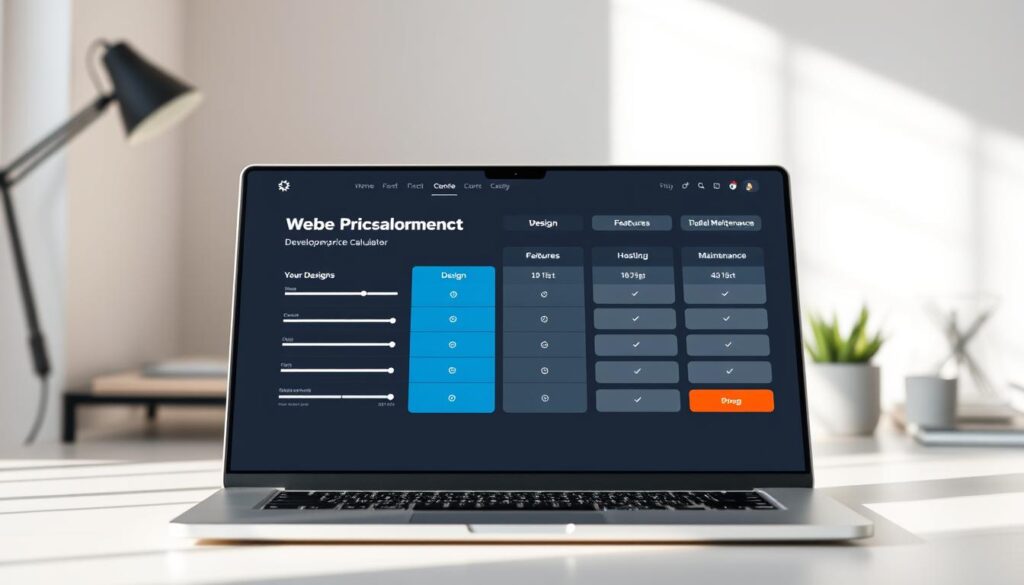
| Feature | Options | Impact on Budget |
|---|---|---|
| Design Complexity | Template vs. Custom | High |
| Number of Pages | 1-100+ | Medium |
| Responsive Design | Needed vs. Not Needed | High |
| SEO Optimization | Basic vs. Advanced | Medium |
| E-commerce Functionality | Yes vs. No | Very High |
For more in-depth planning, think about your SEO needs, the need for responsive design, and any third-party services ties. Adding these details to the web development price calculator sets you up for a thorough project estimate.
Types of Website Projects and Their Cost Structures
There are many types of website projects, each with different costs. Understanding these can make the cost to build a website clearer. Whether you’re looking into e-commerce or want a simple corporate site, we’ll cover the costs. We’ll explore how complexity affects pricing in website build, design, and development.
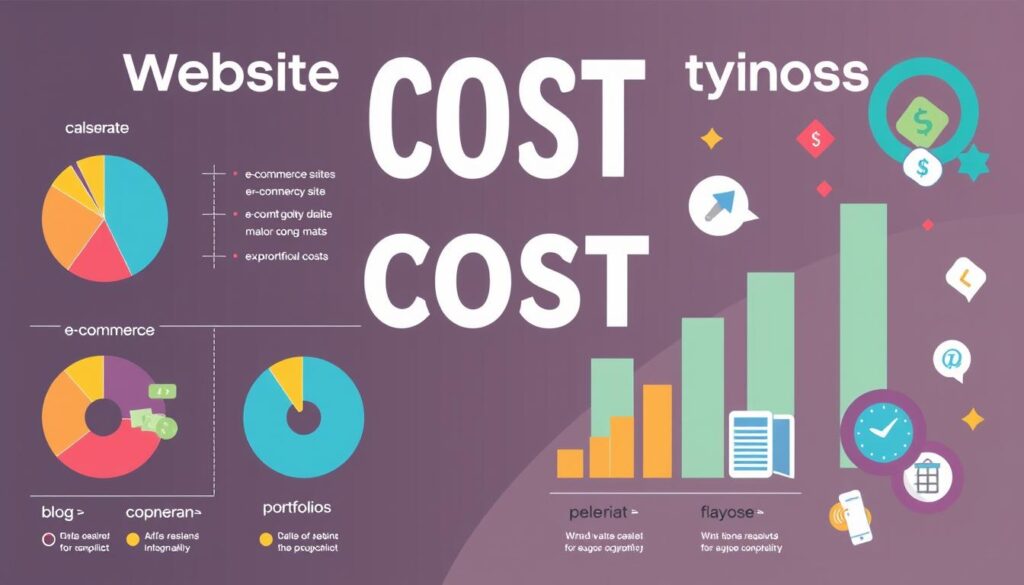
For starters, template-based and basic websites are on the simpler side. They’re perfect for those needing an online presence without complex features. These include portfolio or basic corporate sites. On the other hand, e-commerce platforms and web portals need more work. They cost more because they need unique designs, secure payments, and strong customer services.
| Type of Website | Development Cost | Example |
|---|---|---|
| Landing Page | $5,000 | Startup Product Launch |
| Portfolio Website | $6,000 | Freelance Artist |
| Blog Website | $7,000 | Lifestyle Blogger |
| eCommerce Website | $60,000 | Online Apparel Store |
| Corporate Website | $10,000 | Midsized Business |
| Educational Website | $60,000 | Online Learning Platform |
| SaaS Website | $75,000 | Business Software Service |
| Social Media Website | $120,000 | Community Engagement Platform |
| Marketplace Website | $73,000 | Arts and Crafts Sellers |
The cost to build a website can vary a lot. For example, setting up a simple blog is cheap. But, a big e-commerce site costs more because it must handle a lot of visitors and keep data safe.
Spending smartly on website build, design, and maintenance is critical. It depends on what your business and customers need. Knowing these costs early can help you save money and trouble later on.
Choosing the Right Web Design Solution for Your Budget
When starting a new web design project, it’s important to consider your options and budget. You can choose from freelance designers, specialized agencies, or corporate web builders. It’s key to find what works best for your goals and budget.
Freelance Designer vs Specialized Agency: A Cost Perspective
Deciding between a freelancer and a specialized agency means looking at costs and quality. Freelancers are usually less expensive, charging between $500 and $5,000. Agencies charge more, from $3,000 to $10,000, because they offer more expertise.
It’s wise to consider the value of professional web design. A great guide on responsive website design explains how good design improves user experience.
Corporate Web Builders: Balancing Cost and Customization
Corporate web builders are a middle option. They offer pre-made templates that are easy on the wallet. Starting at $300, they’re affordable but might have extra costs for hosting and SSL certifications.
| Type | Cost | Customization | Best for |
|---|---|---|---|
| Freelancer | $500 – $5,000 | High | Small projects, Individual businesses |
| Specialized Agency | $3,000 – $10,000 | Very high | Medium to large businesses, Complex functionality |
| Corporate Web Builder | $300 – Recurring | Low | Fast deployment, Basic online presence |
Every web design solution has its own set of benefits, depending on your business size and needs. You might prefer a freelancer’s personal touch, the expertise of a specialized agency, or the quick setup of a corporate web builder. Understanding these choices will help you find the best route for your online success.
Price Ranges for Different Levels of Website Design
It’s key for businesses to know how much website design might cost. Costs will vary a lot depending on what you want. Choices range from a basic website to a top-notch world class website.
A basic website is like a simple car for getting around. It uses standard templates and fewer custom features. The price is usually between $1,000 and $2,000. These sites are great for small businesses or personal blogs needing an online spot.
What to Expect from Basic to World Class Website Investments
When you move from a basic website to fancier ones, costs and features grow. A custom website made just for you can cost $5,000 to $50,000. It can do more, like handle sales or store data, fitting bigger business needs.
Pros and Cons of Each Design Level in Terms of Pricing
A world class website is the luxury version, costing $50,000 to more than $100,000. Like luxury cars, they come with the best tech, unique features, and high performance. They give big companies an edge and strong branding.
Each website level has its ups and downs. A basic website is cheap and quick to start but might not grow with you. High-end sites offer a lot but can cost a lot and be hard to keep up. Yet, their broad features offer rich potential.
To make good choices, businesses can use tools like the website cost calculator. It helps compare what you’ll spend versus what you’ll get back. With it, finding the right balance between costs and benefits is easier.
Choosing the right website design level should fit with your business plan, branding, and digital goals. It’s about finding the sweet spot between spending and getting what you need.
Breaking Down the Cost Components of a Web Design Project
When you start a web design project, it’s key to know each cost. The project’s size, complexity, and functionality impact the budget. Let’s dive into the main factors that affect your costs.
The number of pages your site needs is crucial. More pages mean more work and higher costs. A simple site might cost around $500. But, a complex one can reach up to $25,000.
The website functionality also greatly affects the price. Basic sites cost less than dynamic ones. Features like secure payments may push the price over $200,000.
| Feature | Cost Range |
|---|---|
| Basic Website (1-10 pages) | $500 – $25,000 |
| E-commerce Website | Up to $200,000 |
| Custom Content Management System | $2,000 – $40,000 |
Choosing a solid content management system (CMS) helps manage content well. Depending on what you need, it might cost between $2,000 to $40,000. It’s a must for sites needing regular updates or those with lots of content.
Don’t forget about domain and hosting costs. Domains usually cost $7-$14 a year. Hosting fees range from $4 to $50 monthly. They’re small but ongoing expenses.
To get a better cost estimate, try the Website Cost Calculator. It considers many factors like page numbers and design needs.
In the end, understanding web design costs requires deep knowledge of many elements. From page count to CMS choice, every part influences the budget. Use reliable tools to map out the financial needs of your project accurately.
How Web Design Agencies and Freelancers Price Their Services
Choosing between a web design agency and a freelancer is big for budgeting and planning. Let’s dive into their pricing methods. This info is key when you’re looking into website design and development services.
Agencies have a set pricing structure. They offer packages for different levels of needs and complexity. These can include everything from the start of the design to maintenance. Thanks to their big teams, agencies can cover it all, which shows in their prices.
Freelancers, on the other hand, have flexible rates. They are perfect for smaller projects or tight budgets. Their fees change based on their experience, skill, and the project’s details. Freelancers may charge by the hour or project. This means they tailor their approach to each client.
Let’s compare their general pricing:
| Service Type | Average Hourly Rate | Typical Project Cost |
|---|---|---|
| Agency Web Design | $75 | $6,760 (basic website setup) |
| Freelance Web Design | $30 – $80 | $500 – $5,000 (depending on complexity) |
The difference in costs between agencies and freelancers also affects other services. For instance, content creation costs between $500 to $5,000. Big web development projects can range from $3,000 to more than $25,000. And, large e-commerce websites might cost up to $200,000.
Moreover, consider the ongoing costs for keeping the website up-to-date. This is necessary for a smooth, secure, and current site. It generally costs between $500 to $1,000 each year.
It’s not just about the cost. Think about what each option adds to your project. Agencies provide lots of resources and quick work. In contrast, a freelancer can offer a personal touch and flexible terms.
Choosing between a website design agency or a freelancer should match your budget and goals. Make sure your investment in website design and development is wise.
Conclusion
Navigating web development costs shows the value of using a website cost calculator. This tool helps plan your budget for growing online. It’s key to think about all costs, not just the first design cost. While calculators give a rough idea of costs, talking with experts gives you detailed insights.
The kind of website you want, like an e-commerce site or a blog, changes the estimate website expenses. Things like forms, social media, and animations can increase web development costs. These tools help you understand costs better, letting you adjust your plans to fit your budget.
A website cost calculator helps manage your spending, plan for financial needs of making a website, and meet business goals. It’s helpful in talks with freelancers or companies, showing clear pricing. With it, you can make a website that helps your business grow without just being another cost.

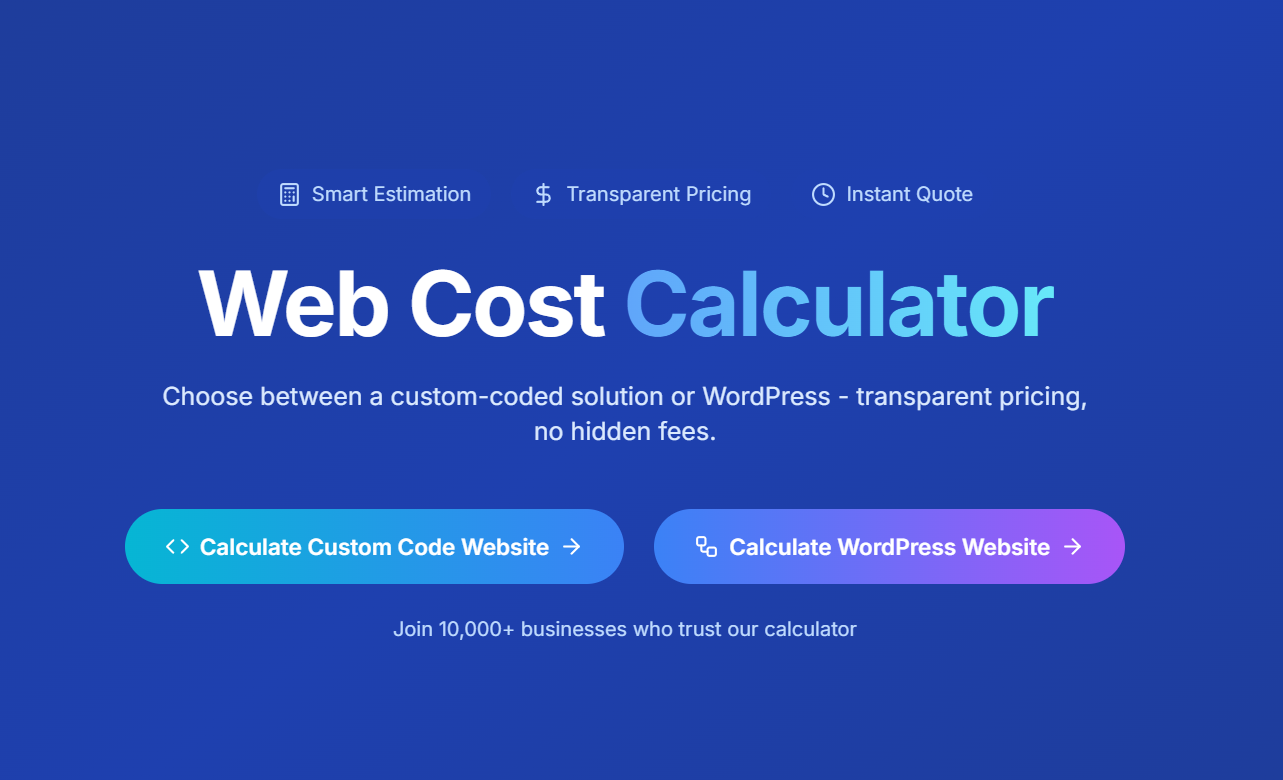
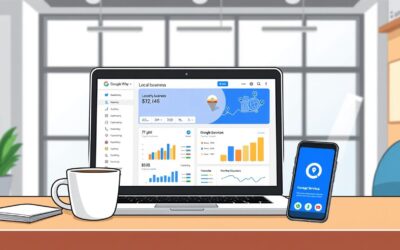

0 Comments